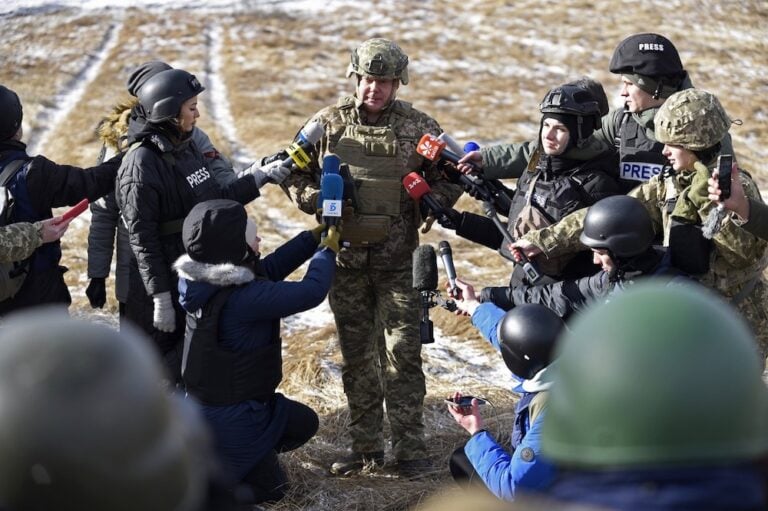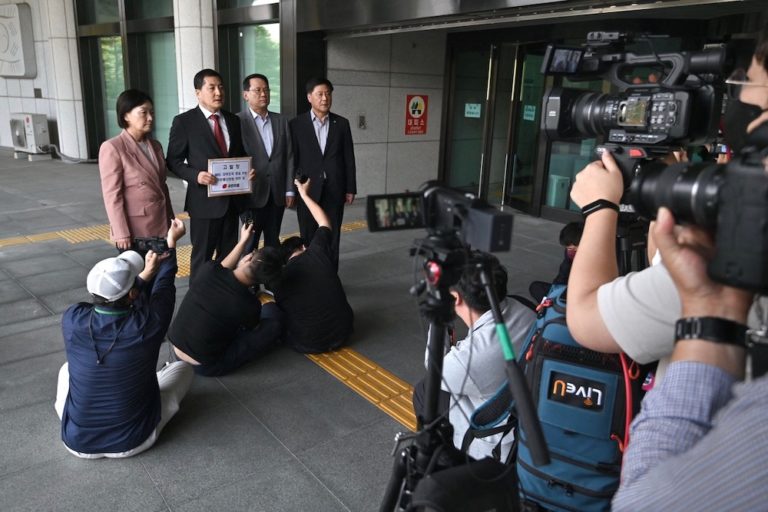(IPI/IFEX) – The following is a 19 November 2007 IPI letter to South Korean President Roh Moo-hyun: His Excellency Roh Moo-hyun President of the Republic of Korea Cheong Wa Dae (Blue House) Seoul, Republic of Korea Fax: +822 770 2209 / 770 2549 Vienna, 19 November 2007 Your Excellency, The Executive Board of the International […]
(IPI/IFEX) – The following is a 19 November 2007 IPI letter to South Korean President Roh Moo-hyun:
His Excellency Roh Moo-hyun
President of the Republic of Korea
Cheong Wa Dae (Blue House)
Seoul, Republic of Korea
Fax: +822 770 2209 / 770 2549
Vienna, 19 November 2007
Your Excellency,
The Executive Board of the International Press Institute (IPI), the global network of editors, media executives and leading journalists in over 120 countries, meeting in Mainz, Germany on 17 November, unanimously expressed great concern about recent developments in South Korea that seriously damage the country’s press freedom.
The IPI Board believes that the Measures for Developing an Advanced Media Support System, the new rules implemented by your government, greatly limit journalists’ ability to access information and therefore to inform the public about issues of public interest.
Regardless of repeated protests by international press organisations, especially IPI, your government, in keeping with your wishes, recently drove the journalists out of the press rooms. IPI was disturbed that the Government Information Agency (GIA) secretly removed at night the makeshift filing facilities set up at the Ministry of Foreign Affairs and Trade.
Furthermore, your government decided to replace the existing press passes with new ones to limit journalists’ free access to government buildings, which IPI believes merely exacerbates the deteriorating press freedom situation in your country.
In his 25 October letter to IPI, Director of the Korean Overseas Information Service, Yoo Jae-woong, stated that it is “an established practice in Western Countries” that journalists are required to “have interviews (with government’s officials) at designated places”.
IPI Board members, who traveled from many different countries to attend the IPI Board Meeting in Germany, denied that this is a common practice in any respected democracy. On the contrary, the board members believe that such restrictions, as well as other ones included in the Measures, represent a retrograde step in South Korea’s credibility as a truly democratic country, in which press freedom is protected according to international standards.
The IPI Board seriously considered placing South Korea back on the IPI Watch List, a list of countries in which press freedom has rapidly deteriorated. However, the IPI Board decided to wait until after the upcoming Presidential Elections in your country. In doing so, IPI notes that all major presidential candidates have promised to remove “the nails” hammered into the press rooms by your government.
As IPI Director Johann Fritz stated in his 27 August letter to Your Excellency, IPI has repeatedly expressed concerns over your animosity to the media, illustrated in such actions as regulations for public servants regarding their contacts with journalists; a competitive system to enable all ministries and administration agencies to counter the critical media; the need for ministries and government-run corporations to report to the GIA in advance for planned advertisements in the critical dailies; the use of tax money to support favoured newspapers and internet media via the Newspaper Development Committee; the government-run “Administration Briefing”, including their role for staging attacks against critical media reports; in addition to the enactment of two major press laws as well as a selective tax probe against the media.
The IPI Board, therefore, strongly urges you to remove the new restrictions against the journalists, thereby reinstating Korea’s reputation as a democratic country in the international community.
Yours sincerely,
The Executive Board
of the International Press Institute (IPI)
IPI, the global network of editors, media executives and leading journalists, is dedicated to the furtherance and safeguarding of press freedom, the protection of freedom of opinion and expression, the promotion of the free flow of news and information, and the improvement of the practices of journalism.


